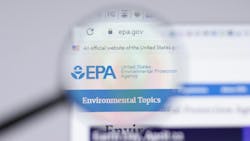Waterkeeper Alliance files FOIA request seeking EPA records on PFAS rule rollback
Waterkeeper Alliance has filed a Freedom of Information Act (FOIA) request with the U.S. Environmental Protection Agency (EPA) seeking records related to the agency’s recent actions to delay and modify the National Primary Drinking Water Regulation for per- and polyfluoroalkyl substances (PFAS).
The organization is requesting communications, environmental analyses, and an unreleased PFNA toxicity report that it says could clarify the agency’s rationale for weakening the standards. The request follows EPA Administrator Lee Zeldin’s announcement of plans to adjust PFAS limits and the agency’s motion before the U.S. Court of Appeals for the D.C. Circuit to partially vacate the rule.
“The science is clear and unequivocal: PFAS are extremely dangerous and are poisoning our drinking water,” said Jacqueline Esposito, advocacy director at Waterkeeper Alliance, in a press release. “EPA’s sudden reversal on these vital protections is a shocking betrayal of its mission to safeguard public health and the environment.”
The FOIA request covers the period from January 20, 2025, to the present and seeks records involving EPA officials, water utilities, industry groups, and trade associations. It also requests documents related to delaying compliance for PFOA and PFOS from 2029 to 2031 and rescinding standards for PFHxS, PFNA, GenX, and chemical mixtures.
Waterkeeper Alliance has asked for expedited processing, citing an “imminent threat to health, life, and safety.” The group also criticized EPA’s proposal to eliminate environmental justice as a criterion for expedited FOIA requests—arguing that the change would make it harder for overburdened communities to access timely information about water quality.
“By delaying these essential protections, EPA is telling our most vulnerable communities that their health is expendable,” Esposito added. “We have the right to safe drinking water, and we will use every tool at our disposal, including this FOIA, to fight for it.”
Waterkeeper Alliance said it plans to publicly release its findings once obtained, to help communities, states, and Tribes respond to what it views as a rollback of federal clean water protections.
